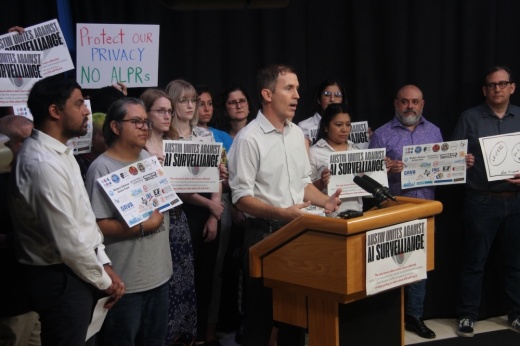Austin to halt police license plate reader program after public pushback

By Ben Thompson
|
5:25 PM Jun 4, 2025 CDT
Updated
5:25 PM Jun 4, 2025 CDT

Council member Mike Siegel (center) spoke about his opposition to Austin's automated license plate reader program during a June 4 press conference. (Ben Thompson/Community Impact)
The Austin Police Department's use of dozens of automated license plate readers, or ALPRs, will end this month following community pushback against the data collection initiative.
What happened
City Council was scheduled to vote on June 5 to indefinitely continue an ALPR pilot program that started last March and was temporarily extended this spring. However, City Manager T.C. Broadnax moved to withdraw the item after council's recent review of the city's program audit and a June 3 discussion that drew dozens of people to City Hall against the item.
APD leaders including Chief Lisa Davis said ALPRs have proven to be a key crime-fighting tool that helped the short-staffed police department investigate and solve dozens of cases since early 2024, and that officers are properly using the system within council-imposed guardrails. Opponents on the council dais and in the community have said the cameras represent surveillance overreach, and that Austin's contract with public safety technology company Flock Safety allows for unwanted data-sharing with other private sources or federal agencies like U.S. Immigration and Customs Enforcement.
Despite having confidence in APD's responsible use of the camera system, Broadnax said he was pulling the proposed program extension from council's June 5 agenda in response to negative public reactions.
"Given concerns expressed today, I have decided to withdraw this item from the agenda at this time to provide more opportunities to address council members’ questions and do our due diligence to alleviate concerns prior to bringing this item back to City Council for consideration," he said in a June 3 message to city leaders.
Zooming in
The revival of police ALPR use in Austin was first considered back in 2022 after the program's 2020 suspension. Since the $114,000 pilot officially launched last year, city auditors found dozens of arrests had been made under the program based on tens of millions of license plates scans.
Several council members and community groups against the ALPR system gathered at a June 4 press conference to support the program's shelving for now, and in the future. Council member Mike Siegel, who'd raised concerns about the program and use of Austinites' data, said the city shouldn't be involved with the "dramatic negative impact" on civil liberties and personal privacy.
“I think we showed collectively why programs like ALPRs in Austin should be scrutinized, why contracts with vendors like Flock must be scrutinized. Because we can’t just take their verbal assurances, right? Once we looked at the contract with Flock, we realized that Austin’s data was being put at risk," he said.
 Austin will pause the police department's use of automated license plate reader technology citywide after a one-year pilot program generated community concerns. (Courtesy Adobe Stock)
Austin will pause the police department's use of automated license plate reader technology citywide after a one-year pilot program generated community concerns. (Courtesy Adobe Stock)Council member Zo Qadri labeled ALPRs as "bad policy," regardless of police assurances about the cameras' intended use. He also flagged a new Flock tool that could reportedly use limited ALPR data to build extensive personal profiles of individuals and their activities, information that could possibly be accessed by entities like ICE.
"Austin should never be complicit in building a database that can be used to punish people for who they are, who they love or the choices they make about their bodies. And we’ve heard from so many stakeholders ... about the dangers of this item," he said. "This is about freedom, it’s about privacy, and it’s about keeping our city a place that lives up to its values that we say that we believe in."
Qadri and Mayor Pro Tem Vanessa Fuentes both said they now hope to see APD find alternative tools to help with criminal investigations. Fuentes also said that addressing shortcomings in the department's recruiting strategy could be an effective way to address vacancies and any enforcement gaps.
After further review, the Flock ALPR program extension could return for council consideration before the end of 2025. For now, more than 500 ALPRs affixed to APD vehicles are still operating under separate contracts with safety technology firm Axon Enterprise Inc.
APD and Flock didn't respond to requests for comment about the Austin pilot's cancelation as of press time.
Zooming out
The freeze on Austin's program came as council members in nearby San Marcos voted 5-2 against an expanded contract with Flock for additional ALPRs on June 3.
Austin is one of many cities in Central Texas and statewide where ALPRs are used for public safety purposes, like in nearby Lakeway, Rollingwood, West Lake Hills and Leander. Officials in cities like Flower Mound have also expressed reservations about the technology's use in recent years.
.png)


